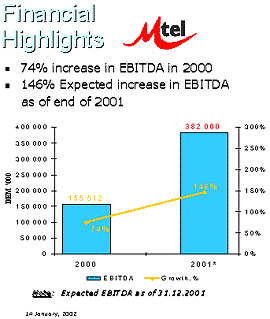 THE "MOBILE" ECONOMY THE "MOBILE" ECONOMY |

The existence of high-level Bulgarian experts was most convincingly demonstrated by the unexpected success of Bulgaria's first GSM mobile operator, MobilTel.
According to Rumyana Kyuchukova, MobilTel's Executive Director, "a basic prerequisite for our success was the existence of qualified experts in the telecommunications sector, which we have in the country. They were educated in Bulgaria and specialized abroad. Our foreign suppliers like Siemens, Alcatel, Nortel, say that we have top specialists in this sector. Our suppliers came with the intention to teach us, but soon they found that we have well-educated people who can run the business according to Western standards."
With DEM 200 million paid in taxes in 2001 alone,MobilTel has emerged as one of the largest companies in Bulgaria's economy. Kyuchukova reiterated the message of the partners of the DGKV Law Firm: "Come to Bulgaria and you will find good opportunities for investments. You will meet wonderful people here and you will not regret that you have come to this country."
The general education standards in Bulgaria are very high. As for MobilTel, the average age of the people working in the company is 32-33. They are young, ambitious, and adaptive and they have bigger opportunities to work abroad where they would have been paid much better salaries than in Bulgaria. However, they prefer to stay in this country because they have confidence in the company, they think that their company is stable and they can rely on us for a normal future in their own country.

MobilTel actually set the standard in mobile communications,
quickly emerging way ahead of the Mobikom
NMT analog operator. Currently MobilTel alone
has about 1 million subscribers, with another 300,000
spread among its competitors - Mobikom and the GloBul
GSM operator that started operations in the
middle of 2001. For a single operator, reaching
one million subscribers is seen as a huge success
for a country like Bulgaria. Within less than 4
years the GSM handy phone turned from a luxury into
a necessity. MobilTel expects that the number of
mobile communications subscribers will rise in the
next 2 or 3 years to 50-60% of Bulgaria's population,
which is a typical level for all developed countries. |

For the time being, about 80% of the territory of Bulgaria, with some 90% of the country's population, is covered by the cellular communications networks.
The story of MobilTel could be seen as a cross-section of Bulgaria's economic development since the fall of the communist regime in late 1989. The company was founded by a Bulgarian, Krassimir Stoichev, who had his own company; Tron, registered in Austria. After the first stage of development, MobilTel changed its ownership after Stoichev decided to pull out as he obviously ran out of his depth in a business that could stay afloat only by constantly expanding. After a succession of transactions, in February 2002 MobilTel was acquired by an Austrian consortium, formed by Management Thrust Holding AG, Kordt und Partners, BAWAK-PSK (the third largest Austrian banking group) and MS-Privat Stiftung. The deal has obvious political implications as the consortium has substantial businesses in both Austria and Germany - two of the EU member states that would have a major say in approving Bulgaria's accession to the Union. At the same time, the credibility of the consortium members would finally end a succession of developments that have often made MobilTel susceptible to official pressure in Bulgaria.
The emergence of a solid international investor in Bulgaria's telecommunications sector in the beginning of 2002 could hardly be seen as a coincidence. The monopoly of the state-owned Bulgarian Telecommunications Company (BTC) over fixed-line voice communications expires on January 1, 2003, which will mark a major shift in the overall economic environment towards deregulation. Meanwhile, the incumbent government primes to privatize BTC - something that could have been done several years ago were it not for the substantial interests vested in a business doomed to success in a country that aims to part irreversibly with its socialist-type planned economy heritage.
According to Rumyana Kyuchukova of MobilTel, the monopoly of the Bulgarian Telecommunications Company is an obstacle to faster development of the whole sector. She sees the privatization of BTC as an indispensable step in this direction.
Tim Buisseret and Richard
Loweth of the Mobikom NMT mobile operator expect
that with the elimination of the BTC monopoly there
will be a lot of room for growth of both fixed line
communications and higher quality services. "There
will also be many opportunities in IP-based virtual
private network services, which allow companies
to connect together their sites around the country
in a very cost-effective way. Value added applications
like e-commerce will come as well but it is still
early for that here. There are some barriers to
growth - the level of use of credit cards is low
here and this is by far the most common means of
payment on the Internet. So the opportunities for
e-commerce are currently pretty limited. But having
said that, there is a debit card which is widely
used now so that is beginning to present some opportunities
for online purchase." |

